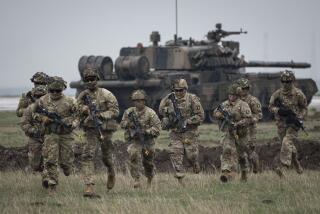No Welcome Sign for Russian Forces
- Share via
ORAHOVAC, Yugoslavia — If there is a single message that most people in this quiescent town of old Turkish-style homes in southern Kosovo wish to convey to the world, it is this: Russians, stay out.
On Monday, for the fifth day running, about 5,000 ethnic Albanians in this town of 30,000 people marched peacefully but resolutely through the central square and down the main street to the headquarters of Dutch troops who are here as NATO peacekeepers.
They demanded that the peacekeeping mission drop plans to replace the Dutch, who have been on duty here for a month, with a battalion of Russians.
“We are ready to lie down in front of the tanks to stop them,” said Shaban Kruezi, one of the older men in the town.
“Not even if Gen. [Mike] Jackson asks it, we will never accept them,” he said, referring to the British commander of the North Atlantic Treaty Organization troops in Kosovo, who is lionized as a hero by most ethnic Albanians.
The problem is that many townspeople equate the Russians with the Serbs, who so recently oppressed and killed them. Moreover, many people in Orahovac insist that Russian mercenary fighters took part in the reign of terror that began in Kosovo in March. Russians and Serbs are longtime allies.
The resistance of the townspeople to the Russian deployment is so intense that even the Dutch commander on the ground, Lt. Col. Tony Van Loon, says that he wishes it would be reconsidered.
He pointed out that Orahovac “was one of the biggest killing areas” in the recent conflict. Because of this, “the sensitivity of Albanians [to a Russian deployment] is much greater than in the other areas,” Van Loon said.
The dilemma facing NATO, however, is that the Russians were promised a base in the Orahovac area in an agreement hammered out with great difficulty in Helsinki, Finland, last week. To satisfy the local complaints, the alliance would risk breaking a commitment.
Adding to the problem, Van Loon said, is the fact that maps used during the recent NATO-Russian talks were inexact. So it is uncertain whether the agreement means that the Russians are to deploy in Orahovac or in the village of Malisevo, 10 miles to the north, or in both places.
Russia was critical of the NATO air campaign and has insisted on being given significant peacekeeping duties--especially to protect Serbs from the wrathful ethnic Albanian majority now returning to Kosovo, a separatist southern province of Serbia, the main Yugoslav republic.
The Russians initially wanted a sector of their own to control, but NATO insisted that they be dispersed in the French, German, British and American sectors of Kosovo.
Over the weekend, the first of the planned total of 3,600 Russian peacekeeping troops began deploying outside their main base at the airport in Pristina, the provincial capital. About 80 of them are in the process of setting up camp in Kosovska Kamenica, a town in the southeast sector of Kosovo, which is administered by U.S. forces.
But they were not warmly welcomed. In a protest Monday mirroring the marches that have been taking place in Orahovac, about 1,500 ethnic Albanians shouted “Russians, go home!” at a group of Russians driving through.
In Orahovac, a group of men standing across the street from a Dutch tank explained why they so vehemently oppose any Russian deployment.
One of them, Bafia Shexu, a Muslim scholar whose house was burned down at the end of March, said that, during the recent conflict, some of the soldiers were dressed as ordinary Serbian troops but could speak only Russian.
Townspeople also said they fear that the Russians will allow the escape of Serbian police and paramilitary fighters responsible for massacres. Some of these are believed to be finding shelter with 400 ethnic Serbs in one neighborhood.
The Dutch are preventing the Albanians from attacking the Serbs but are also investigating whether there are indeed war criminals in the Serbian enclave, Van Loon said.
He said the guerrilla Kosovo Liberation Army gave him a list of 64 suspected participants in recent killings allegedly still hiding out, and he agreed that it is “most likely” that there are war criminals there but said that he hasn’t made any arrests because “the evidentiary situation must be very clear.”
The Dutch have, however, cleared out two secret Serbian radio transmitting stations inside the enclave and arrested and expelled to Serbia proper a group of Serbian Interior Ministry police who had remained behind in violation of the June 20 deadline for all Serbian police officers and soldiers to leave Kosovo.
“The situation is very, very tense here, and that should be known by all,” said Daim Nurrasa, an ethnic Albanian resident. “There is a risk that we will have fighting again between us and the Serbs if the Russians come. If the Russians come, we may have to fight them too.”
More to Read
Sign up for Essential California
The most important California stories and recommendations in your inbox every morning.
You may occasionally receive promotional content from the Los Angeles Times.













